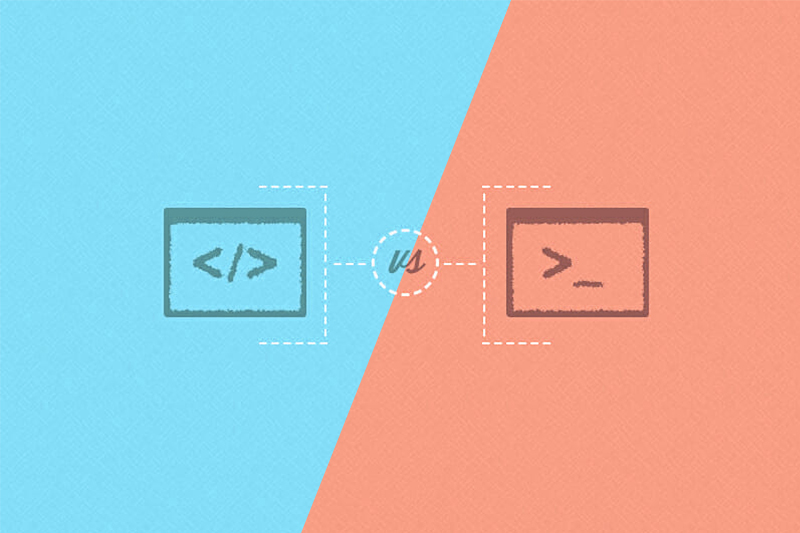
If you ever came close to talking or reading about programming, you surely heard about coding and scripting. However, if you are new to the industry, you are probably wondering if scripting is the same as coding. Most people think that the two refer to the same thing, but there is a significant difference between them. To put it simply, coding lets you create a program, while scripting lets you control a program that was created with coding. In this article we will take a much deeper look into the difference between code and script, so keep reading.
What is scripting?
Scripting is the process of adding functionality to a certain program, or making a program “do something”. We could say that scripting is part of coding. For example, with coding you can make a static website, and then with scripting, you turn that website into a dynamic one. Another thing that scripting can do is automation. For example, you could make a script that sends an automatic text message to all the people who called you, but you didn’t answer the phone. Or, a script that can automatically empty your recycle bin.
Advantages of scripting
When scripting, you can perform highly efficient and fast editing with a limited amount of variables and data structures available. Scripting is easy to learn, and you don’t need much knowledge of web technology. Interactivity is necessary for all modern web pages because it helps in adding visualization interfaces. For this reason, scripting is a necessity when it comes to enhancing websites. Finally, scripting provides functionality thanks to different libraries that help in creating new apps.
Scripting languages
Scripting languages are programming languages. However, a scripting language performs actions in a runtime environment, for example performing configuration, automating task execution, extracting data, or enhancing the functionality of the parent software. They don’t require compilation and they are interpreted. A scripting language brings new functions to apps and glues complex systems together. It is designed for communication and integration with other programming languages.
Here is a list of the most commonly used scripting languages:
Python
Python is free, open-source, and easy. It supports both object-oriented and procedure-oriented programming. It’s an interpreted language and its lines of code are scripted. Currently, Python is one of the most in-demand programming languages in the world.
Node.js
Node.js is a framework used to write apps using JavaScript. This is another widely used scripting language, with corporations like IBM, Netflix, PayPal, Yahoo, Microsoft, and Linkedin using it.
Bash
Bash is a scripting language used for working in Linux. Bash is one of the easiest scripting languages to use. It creates useful, reusable scripts and conserves documentation for other users. Bash also describes the tools and the code in the command line.
Ruby
Ruby is great for web development and it’s well-known for its flexibility that allows developers to create software that’s innovative and modern.
Perl
Perl is famous for performing exquisitely in text manipulation tasks, so many high-traffic websites use it. It is also found on all Windows and Linux servers.
Server-side scripting vs Client-side scripting
All scripting languages can be divided into two categories: server and client-side. Server-side scripting languages require a server for their processing, so they run on a web server. When a client sends a request, the server sends content via HTTP. On the other hand, client-side scripting languages don’t require a server. Instead, they run on the client end, more precisely, on the client’s web browser.
Client-side scripting is focused more on functionality and user interface. The main benefit of client-side scripts is that they can reduce demand on the server, which makes web pages load faster. Server-side scripting is focused on faster processing, resolving errors, and access to data. The main benefit of server-side scripts is they aren’t viewable by the public like is the case with client-side scripts.
The most popular client-side scripting languages are HTML, Javascript, and CSS, whereas for server-side scripting languages we’ve got Java, Python, PHP, Node.js, Ruby, and Pearl.
Application of scripting
Scripting languages are used in different areas, both on and off the web. They are widely used in web applications and system administration. Scripts are also used heavily in multimedia and games. For example, Minecraft allows users to create their own items and world in the game by using Java for scripting. Games like Second Life, Trainz, and Wesnoth also allow users to create game extensions with scripting. Similar to game extensions, scripting languages are also used to create extensions and plugins for other programs and applications. For example, Google Chrome’s browser extensions are all run using scripts.
What is coding?
Coding is a process that allows programmers to create all kinds of software, apps, and websites from scratch. Computers can’t work on their own, they don’t know how to do anything. It is the job of a programmer to give computers instructions. So, the closest definition of coding would be “the process of creating instructions for computers using programming languages”. Coding is human means of communicating with machines. Computer code is everywhere around us, in technologies we use and interact with every day.
Advantages of coding
Coding can be simple and easy to learn. Although the popular opinion on coding is that it’s something very difficult, anyone can learn the basics. Coding is much like books. Some books are simple and easy to understand, while others use complex words and the story is hard to follow. Nevertheless, they are all books. The more books you read, the better you get. Learning to code is the same. Coding is everywhere around us, which makes it a future-proof skill. There will always be a need for programmers, and it’s smart to take your career in that direction. There is a lot of creative work involved in coding, so if you like to let your imagination run wild, this might be the career for you.
Programming languages
Coding is the process of using programming languages in order to get a computer to perform the functions you want. Programming languages are sets of rules that define how to write code, and they are used to create software, apps, and web pages. While we had “scripting programming languages” previously, all programming languages are used for coding, so there is no need to use the term “coding programming languages”. Some of the most popular programming languages are HTML, C, C++, Python, Java, Ruby, PHP, and Perl.
There is a lot of ways to classify programming languages, but most commonly we look at their applications and language level. Some languages are used for front-end development, primarily for web pages. Others are used for programming entire software programs, so they would be considered more complex and back-end. When we talk about language level, there are low-level and high-level programming languages. The first ones are closer to binary code, and the second are closer to human language. This means that low-level languages are much more difficult to use and understand, but they offer more freedom. High-level languages are easier to understand and code with, and they are usually what beginners opt for.
Application of coding
It’s difficult to name all the areas where coding is applied since almost every aspect of modern human life relies on coding. Coding is the building block of every computer, phone, tablet, TV, app, and other devices we use daily. Every new car uses code to control functions, from air conditioning to fuel injection. Code helps operate traffic signals. Every video game is developed by coding. It’s safe to say that computer code is everywhere and the applications of coding are endless.
Coding vs Scripting
We said that coding enables us to create a program, while scripting enables us to control and modify that program. So, we know that there is a difference, but how significant is it? Can a person do both coding and scripting? The two are very similar and in most cases, programmers do both. The only way to do only one or the other is either working in a massive company like Google, where one person is dedicated to one specific field, or freelancing and looking for specific projects. Otherwise, if you’re a programmer, you are going to do both.
Coding is significantly more difficult and complex than scripting. For example, in order to run a program, you need thousands of lines of code. In order to automate a particular process within the program, you need scripting. Scripting requires a lot fewer lines of code, and it’s the next step after coding. A code needs to be compiled, and a script has to be simply interpreted. All in all, if you are good at coding, scripting will be a breeze for you.

Coding vs Programming
What is the difference between coding and programming? Well, there are a few categories we can use to help us break down the differences.
The terminology
Coding is the process of using a programming language to establish communication between humans and computers. Programming is the process of creating the structure for the program’s code that follows some standards. This structure is established before the actual code is written so that it can perform the task it needs to perform.
Level of knowledge
In order to code, it’s enough to have basic knowledge of a programming language and its syntax. Once you learn how to code in one language, it will be easier to learn other languages. On the other hand, programming requires much more knowledge, to begin with. A programmer needs to know how to debug and test your code, create and work with algorithms, manage projects and work with programming languages. For coding, you don’t need any prior preparation. For programming, you need a methodical approach.
Type of language
When coding, you write commands for a computer or machine in the natural language, along with certain codes. Those codes then help the computer interpret your command and work accordingly. Programming requires you to use multiple codes and sometimes multiple languages to make efficient software.
Tools
If you are coding, your most important tool is a text editor, for example, Notepad. Some more complex ones and rich with features are Visual Studio Code, Atom, and Sublime. When it comes to programming, you need a lot more tools. Some of them include code editors, assemblers, analysis tools, debuggers, modeling frameworks and algorithms, and more. Of course, using these tools requires a lot of experience.
The end product
Your expected outcome as a coder is simple - after your coding, the solution will successfully give your desired output. For example, converting a PDF into an audio file. On the other hand, programmers need to create an entire application or software that people will use. They also need to follow up and maintain what they built so that it runs smoothly and without glitches.
Scripting vs Programming
It’s much easier to compare scripting and programming because one is significantly easier to master than the other. Again, we’ve got some categories that can help us distinguish the differences between the two.
Usage
Programming supports the development of a program from scratch and sets up basic communication with a system. Scripting, on the other hand, combines different components of a program to make it work properly.
Type of language
A scripting language is based on the interpreter and its function is to make a program automatic. You can use a script to run several sequences in a program. A programming language is made up of a series of codes and it demands compilation. This means that in order to make the machine perform a specific task, various codes need to be intertwined. Programming languages are significantly more code-intensive compared to scripting languages. What is handled by the platform in the case of scripting, you have to do manually when programming.
Complexity
Scripting takes the minimum time for development and it’s not complex at all, which makes it easily usable. Programming takes a lot of time and it’s quite complex. For this reason, many developers choose scripting languages whenever possible, because it gets the job done faster.
Runtime
Programming languages don’t have to be compiled in real-time. This difference in implementation makes programming languages run faster than scripting languages. Not to mention some typical compiler flaws, such as collective error handling. This causes the compilers to pause or stop every time they come across an error. This is another addition to the total execution time of scripts. However, today this is less of an issue than it was before since we’ve got more modern and faster hardware.
To sum up
The purpose of this article is to provide a better understanding of scripting and coding, and the differences between the two. If we take into account all the applications, benefits, and usage of scripts and codes, it’s safe to say that with hard work, you could easily master both. For more information about our programming courses, visit our website or contact our staff.



